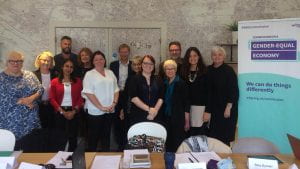The Commission on a Gender Equal Economy spent two days in Glasgow, on 5 and 6 September 2019, taking evidence from women’s organisations, trade unions, economic think tanks, academics, and government officials on key policies in Scotland to advance gender equality and what are the persistent barriers to a more gender equal economy.
The Commission on a Gender Equal Economy is an 18-month project led by the Women’s Budget Group (UK). The work and investigations of the Commission are informed by evidence from a range of perspectives from individuals, women’s and other third sector organisations, economic commentators, academics and think tanks.
The Glasgow evidence session is one of a number of meetings across the UK and we heard about developments on the Scottish Government’s 2019 Gender Pay Gap Action Plan, the Fair Work Convention, Gender, Equality and Human Rights budgeting, approaches to Inclusive Growth, proposals for a wellbeing economy, and lots more.
In my role at the Wise Centre for Economic Justice I am a Commissioner. What a privilege it is to be part of this Commission, but it does make you wonder why we are still calling for women’s economic equality and making the case for change in valuing women’s work. We are, though, and I believe that our Commission will make a difference.
Valuing unpaid work and how paid work is valued is essential in building the economy. Raising the standards of women’s work, pay and conditions is essential. Investing in care is fundamental and not a trade off against other forms of ‘investment’.
There are challenges in changing attitudes about work, caring, public spending and public finance, and what we mean by investment. As a society, we have to think about whose work we value, how we want to support parenting, how we pay for quality and accessible care for children, older people, and people using social care.
We have to make sure that across all these policy levers that we are thinking about women and men in all our diversity; what services and support disabled women and men require to access employment, volunteering and other opportunities, and the ways that public policy decisions create barriers and resistances to Black women and men and people of colour.

The highpoints of this Commission are, firstly, that it is happening! When so much in our political world is up in the air, we are looking at concrete ways to tackle persistent inequalities of income, value, and experience.
The Commission is taking evidence directly from all sorts of organisations working to advance equality and tackle gender inequalities and our calls for evidence are further opportunities for comments and ideas from across the UK.
Our Visiting Professor at the Centre for Economic Justice, Diane Elson, Chairs the Commission. I asked Diane about the Glasgow sessions in advance, and she said:
“I’m delighted to be back in Glasgow where I always enjoy my time at WISE. I am always energised by the enthusiasm of colleagues and the drive for making a difference to people’s lives that I find in Scotland from people working in and outside government and in the community. The Commission needs to know what can be done differently, and Scotland can show the rest of the UK how to think a bit differently about the economy, about equality, and about human rights. But of course, the Commission coming here to find out more about Scotland puts a spotlight on Scotland that government and others have to live up to!”
You can follow the Womens Budget Group and Fair Work Convention on Twitter as well as our Centre for Economic Justice, and I tweet as Angela O’Hagan.
Angela
Be First to Comment